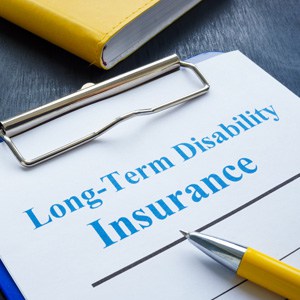Resources

In this article, you can discover… How the wording of an employer’s insurance policy can impact an ERISA claim. Common limitations found in workplace policy language. How a knowledgeable ERISA attorney can help you unpack vague or complex policy language. How Does The Specific Language Of A Policy Impact An ERISA Claim? The language used in an employer’s insurance disability policy is everything. It governs your responsibilities and the responsibilities of your employer. Policy language also describes what you must do to receive benefits and what the insurance company must do once you satisfy their obligation. It covers how long the insurance company must pay benefits and if there are any limitations to the benefits that they pay. All of… Read More

In this article, you can discover… How to avoid common mistakes when submitting medical records with a claim. How an attorney can help you better understand and apply medical terms. How to ensure your medical records are complete and thorough. Why Are Thorough Medical Records So Crucial In Social Security Disability Claims? The evidence in your medical records must be complete and detailed enough for the Social Security Administration to determine the nature and severity of your impairment. Records should also include how long you’ve experienced the impairment. A strong connection should also be made between the impairment, its symptoms, and the symptoms’ impact on your ability to work. Incomplete medical records can result in a delay or termination of… Read More

In this article, you can discover… The most commonly made mistakes on Florida ERISA claims. How to avoid common errors when making an ERISA claim. The benefits of hiring an attorney to help you handle your claim. What Are Common Errors People Make During Application For An ERISA Claim? ERISA, or Employee Retirement Income Security Act, allows you to file a claim for disability benefits with your employer’s insurance. When filing a claim, be sure to properly review your medical records to correct any errors or omissions. You may assume that your physician agrees that you’re disabled or may assume that an insurance company will agree with your doctor’s conclusions. These assumptions can cost you a claim, as can failing… Read More

While it can be difficult to obtain cognitive impairment disability benefits, it is definitely possible. Here are some tips to help you prepare your disability benefits claim. What Is a Cognitive Impairment? The majority of people who file for disability benefits do so for cognitive impairment-related conditions. Cognitive disabilities include difficulty focusing, inability to multitask, memory loss, and trouble making decisions. Cognitive impairment is caused by brain injury, stroke, a psychiatric condition such as depression, or the side effects of medication. Environmental hazards such as chemicals and pesticides can also cause cognitive impairments. Symptoms of a Cognitive Impairment The severity of cognitive impairment varies from mild periods of forgetfulness to significant impairment that results in an individual being unable to care for him… Read More

Chronic diverticulitis can be debilitating, but not everyone with this disease may qualify for long-term disability benefits. If you are wondering, "can I get disability for diverticulitis?" The short answer is yes, but it depends. What Is Diverticulitis? Diverticulitis attacks the digestive system and is caused by the formation of small pouches called diverticula along the intestinal walls. When these pockets become inflamed or infected they can result in severe abdominal pain, cramping, and bloating, as well as fever, nausea, and vomiting. The severity of diverticulitis can range from an acute occurrence to a chronic condition. Doctors are unsure of the precise cause of the disease, but many believe low-fiber diets may be partly to blame. If you suspect you have diverticulitis, see your doctor immediately. If the condition is left… Read More

If you are unable to work, you may be wondering if you are eligible for both unemployment and disability benefits. The answer? Rarely. Yet, some eligibility requirements may occasionally overlap. Eligibility for Unemployment In order to receive unemployment, you must claim to be unable to work. In Florida, you may file an application for unemployment benefits with the Florida Department of Economic Opportunity. Part of that application includes a claim that states you are able to work. You must be considered "ready, willing, and able to work" to obtain unemployment, according to the language used in the application. In addition to this, you must have lost your job due to no fault of your own. These requirements determine your eligibility… Read More

Has Your Condition Changed? How Do You Spend Your Day? What Are Your Symptoms? When Did Your Inability to Work Begin? What are Your Hobbies and Activities? What Are Your Plans to Return to Work? Have You Traveled Recently? How Long Can You Do Certain Activities?” What Kind of Treatment Have You Received? Do You Take Medication? If you receive a call or letter from your insurance company requesting an interview related to your long-term disability, don't panic. It doesn't mean you are about to lose your benefits or that your claim is about to be denied. An interview with an insurance company representative is not uncommon. In fact, up to 50% of claimants are interviewed. Nevertheless, you can prepare… Read More

In this article, you can discover: The process of requesting a second-level review for an ERISA claim denial. How to file an ERISA appeal and the additional evidence needed for a successful appeal. The federal-level appeal process and the importance of hiring an attorney for ERISA cases. Can I Request A Second Level Review If My Initial ERISA Claim Is Denied? The claim and appeals procedures are outlined in your insurance policy or the summary plan description for your benefit plan. Most plans require one level of appeal, while others require a second level before you can bring a lawsuit. Be sure to follow the guidelines of your specific disability plan. Will The Denial Letter Tell Me Exactly Why My… Read More

In this article, you can discover: The duration and coverage of short-term disability plans. ERISA eligibility and common reasons for short-term disability claim denials. Steps to take when your short-term disability claim is denied and the role of an attorney in an ERISA appeal. How Long Is Short-Term Disability? The maximum benefit period for short-term disability depends on your benefit plan. Short-term disability can be as brief as 11 weeks or last up to 52 weeks. However, most plans offer a duration of 180 days or six months. What Illnesses And Injuries Are Covered? All illnesses and injuries are covered under short-term disability benefits unless specifically excluded by the plan. Could A Short-Term Disability Plan Be Exempt From ERISA? Indeed,… Read More

In this article, you can discover: Reasons for long-term disability being delayed or denied. Why you need a lawyer to obtain long-term disability. How insurance companies play a role in disability claims. Reasons it may be worth appealing a denial for disability benefits. Why Might A Long-Term Disability Claim Be Denied? A claim can be denied for many reasons… Perhaps the medical evidence is insufficient, or the condition does not meet the criteria for disability. Alternatively, the claimant's physician may not agree that the claimant is disabled or that their medical condition prevents them from working. In some cases, a pre-existing exclusion in the policy may apply. Or, the insurance company may determine that the claimant can perform another occupation.… Read More
